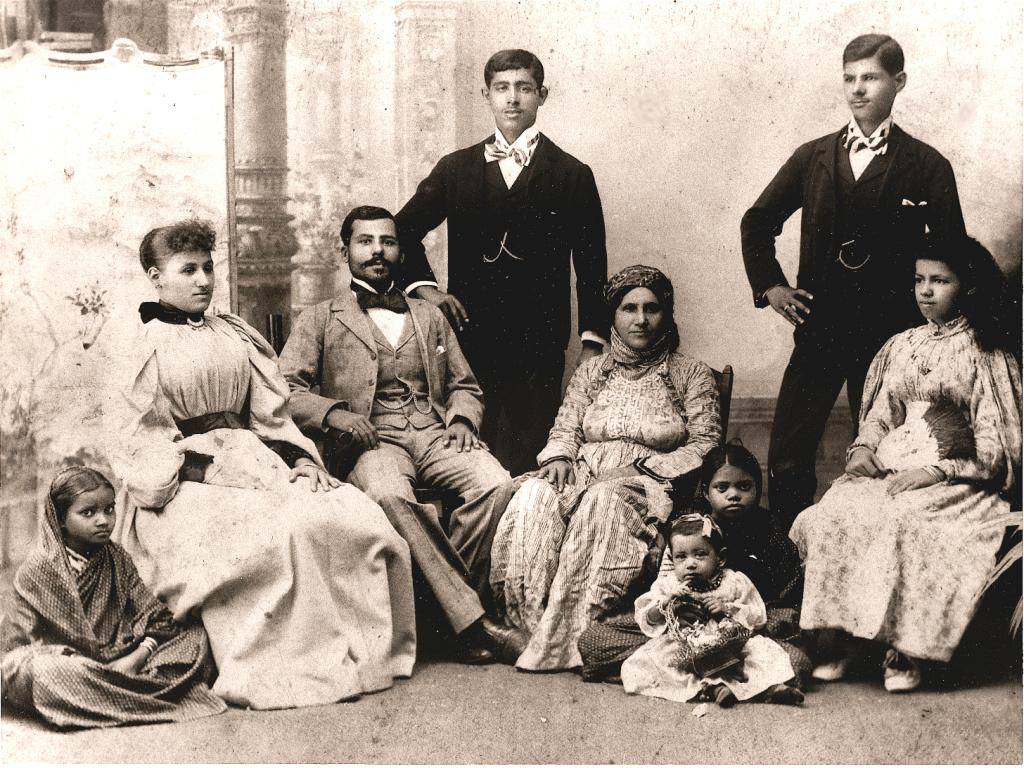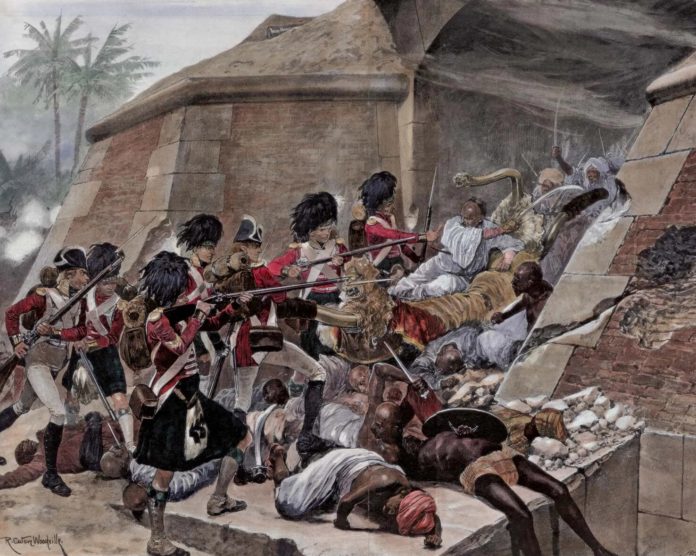In the eighteenth century, Jews were a tiny minority in India when the Honorable East India Company (HEIC) was expanding its land acquisition in that country. There were three groups of Jews in India. Cochin Jews of Malabar (now Kerala); a mix of an ancient group and later arrivals from Spain after Christian reconquest in 1492 were a small group. Baghdadi Jews, also small in numbers, were an Arabic speaking mercantile community based in Calcutta and Bombay that migrated to India in early nineteenth century. The religious, spiritual, and cultural heritage of this community was linked with Arab Baghdad and not India. The largest and oldest group representing over seventy five percent of Indian Jews was the Bene Israel Jews. This group that came to India centuries ago was localized to small Konkan area of the western coast. They were engaged in oil pressing in their villages and were called Shaniwar Tellis (Saturday Oil Pressers) as they abstained from work on Saturdays in observance of the Jewish rest day of Shabbat. Bene Israel had military tradition and served in the armies of Mahratta princes and African Siddi dynasty of Janjira.
In 1755, HEIC annexed Bankot on the Konkan coast bringing Bene Israel under the company’s authority in presidency’s Kolaba district. The earliest record of Bene Israel recruitment in HEIC army is when five Divekar brothers (Issaji, Ellohji, Sillamon, David & Samaji) were recruited.
Samaji Ezekiel Devikar was captured during the Anglo-Mysore war in 1786. Tipu Sultan’s mother, after knowing his religion, interceded for his pardon. The numbers of Bene Israel Jews in Bombay army were exceedingly small, but they held many native commissioned officers’ positions. They were educated and therefore got rapid promotions and held positions of regimental writers and staff appointments. The Bengal army was class conscious where promotion of native sepoys was linked with seniority as well as balance of various castes in promotions and regimental appointments. In contrast, the Bombay army considered merit in promotion to native commissioned ranks as well as staff appointments. This was a key factor in advancement of Bene Israel Jews in the Bombay army despite their exceedingly small numbers.
In 1858, there were about 370 Jews in the Bombay army then numbering 33,000 (about 1.1%). In 1877, Bene Israel represented 1.3% of Bombay Native Infantry (BNI) and by 1895, it had dropped to 0.6%. The 1890 army list shows many Bene Israel native commissioned officers despite a small number of Jewish soldiers in the Bombay army. Several Bene Israel Jews were native officers in 8 BNI including Subedar Major Solomon Daniel, Subedars Ehoodajee Israel, Reuben Nuseemjee and Jamadar Abraham Daniel. Subedar Major of 12 BNI was Jackraalji Israel and Jamadar Samuelji Israel in the same regiment. The list also includes Jamadars Musaji Satkelji and Joseph Daniel (3 BNI), Subedars Amranji Shamaji and Banduji Robonji (5 BNI), Jamadar Samson Jacob (9 BNI), Subedar Daniel Israel (10 BNI), Jamadar Yehooda Jacob (17 BNI), Subedar Danieljee Israel and Jamadar Solomon Yaqub (19 BNI), Subedar Hyem Benjamin (22 BNI), Jamadar Moses Samuel (22 BNI), Subedar Major Haskelji Israel (23 BNI), Subedars Samuelji Israel and Benjamin Elijah (24 BNI), Jamadar Haskelji Israel (25 BNI) and Subedar Major Mossajee Israel of 27 BNI.
Colonial military and civil officials of Bombay presidency including Major General Sir John Malcolm (Governor), James Rivett-Carnac (Governor), Herbert Bartle Frere (Commissioner of Sindh and later Governor), General Sir Hugh Ross (C-in-C Bombay army) and many Colonels who encountered Bene Israel soldiers were full of praise of discipline, intelligence, fidelity, and bravery of Bene Israel soldiers. This positive impression of Bene Israel opened other avenues.
The Army career provided Bene Israel Jews entry into civil employment after retirement. Subedar Abraham David Churrikar (3 BNI) joined Ahmednagar police after retirement and rose to the rank of Assistant Superintendent of Police (ASP) Puna. Subedar Ezekiel ‘Bapuji’ Israel (4 BNI) served with Ahmednagar police after retirement. His son Subedar Major Moses Bapuji (12 BNI) followed in his father’s footsteps with a police career following his army career. English education of children of Bene Israel soldiers in mission and regimental schools gave Bene Israel an edge and many found employment in new careers in colonial administration. They found employment in commissariat, survey, buildings, clerical jobs in railways, post and telegraph and as hospital assistants. Later, they acquired technical skills and worked as mechanics in factories and shipyards of Bombay. Knowledge of English was the key factor that helped in upward social mobility of Bene Israel.
Several factors contributed towards shift in recruitment in the aftermath of the mutiny in 1857. The South was pacified with no potential military threat therefore size of the army was decreased. Military power base was shifted towards North-West in view of turbulent independent tribes of North-Western Frontier, problems with neighboring Afghanistan and background of the Great Game with Russia that was expanding its own empire in the direction of India. The Bengal army became the most vital component defending North-Western Frontier with corresponding decline in importance of Bombay and Madras armies.
In 1870s, in the Bombay army, recruitment shifted heavily in favor of Martial Races (Punjabi, Pathan, Gurkha and Rajputs) and recruitment from Konkan area steadily declined. This affected all Konkan communities including Mahrattas, Mahars (untouchables) and Bene Israel. There was a rapid rise of Muslim component that increased from one fifth to one third. In 1877, Muslims were 19% that increased to 33% in 1895.

The recruitment of Bene Israel was discontinued by the end of the nineteenth century. In contrast to Mahars who vigorously petitioned for re-enlistment, the reaction of Bene Israel was lukewarm. They petitioned for opening of recruitment but when the government offered two class companies of Bene Israel, there was little interest shown from the community. In only two single class companies there would be extremely limited chances of promotion to commission and staff appointments. They had more opportunities in the expanding civil sector in view of their education. Demographic shift of the community from villages to urban centers of Bombay, Pune and Ahmedabad also meant less inclination of Bene Israel youth to opt for life of soldiering.
Bene Israel soldiers became leaders of their community due to their education, broader experience, and connections with colonial authorities. In 1796, retired army officer Samaji Devikar built the first synagogue Shaar Harahamim in Bombay. Subedar Major Mosaji Israel built a synagogue in Thane in 1879. The first Torah scroll (Sefer Torah) obtained from Yemeni Jews was brought to India in 1844 by a Jewish soldier Abraham Issac Galsukar serving in Aden.
In second half of nineteenth century, many factors including posting of retired Bene Israel native officers to police department of Pune, railway connection with Bombay, better climate and lower prices attracted many Bene Israel families to move to Pune. Several synagogues and prayer halls of the city were built and run by retired soldiers. Subedar Major Solomon Balaji Jhiradkar built Jhiradkar prayer hall and Subedar Major Daniel Rahamin Talkar built the Bene Israel prayer hall in Pune. Bene Israel soldiers became administrators of synagogues and schools and helped establish Bene Israel Benevolent Society. Bene Israel synagogues were modest buildings compared to the ostentatious synagogues built by affluent Baghdadi Jews. Conflict based on religious authenticity, class, ethnicity, and economic and social status kept Baghdadi and Bene Israel Jewish communities apart.
Bene Israel Jews were different from other Jewish diaspora communities. It was an exceedingly small community limited to a narrow geographical strip that had no links with other larger diaspora Jewish communities of Europe, Arabia, North Africa, Persia, and Central Asia. They maintained some elements of Jewish faith but possessed no Hebrew prayer texts or Talmud and had no ordained Rabbis. Culturally and linguistically, they were integrated with their non-Jewish neighbors and had adopted many customs of Hindus and Muslims. They were not engaged in occupations generally associated with other Jews. The non-Jew communities of India associated with negative stereotypes of Jews in Europe included Hindu Banias, Jains, Bohras, Parsis and Marwaris. These communities had occupational traits of peddling, trade, money lending and finance common with the Jews of Europe. Bene Israel Jews were different as they were not associated with these occupations but served as soldiers and engaged in oil pressing. They did not experience discrimination or repression in India compared to their co-religionists in other parts of the world. The British encountered a different type of Jew in Bene Israel community and had a positive view about the community.
Bene Israel Jews were a small minority in India and represented about one percent of soldiers of the Bombay army. However, this service improved their image as Jews as they were associated with manly and soldierly qualities in contrast to negative stereotypes of substantial number of Jews in Europe. More importantly, service in Bombay army provided them avenues of upward social mobility. Even when their enlistment was stopped in the army, their social and economic status did not suffer as they became successful teachers, doctors, lawyers, and civil servants. After the establishment of the State of Israel in 1948, a substantial number of Indian Jews migrated to Israel and now less than five thousand, mostly Bene Israel Jews remain in India.
Notes:
- Mitch Numark. Perspectives from the Periphery: The East India Company’s Jewish Sepoys, Anglo Jewry, and the image of ‘the Jew’ in Nina Caputo & Michell B. Hart (Editors). On The Word of a Jew: Religion, Reliability, and the Dynamics of Trust (Indianapolis: Indian University Press, 2019).
- Patrick Cadell. History of the Bombay Army (London: Longmans, 1938)
- The Indian Army List – July 1890 (Calcutta: Office of the Superintendent of Government Printing India, 1890)
- Ardythe Maude Roberta Basham. Army Service and Social Mobility: The Mahars of Bombay Presidency with comparisons with Bene Israel and Black Americans. PhD Thesis, University of Manitoba 1985.
https://open.library.ubc.ca/media/stream/pdf/831/1.0097235/1




